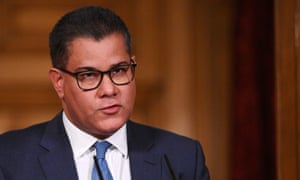Extract from The Guardian
UK energy minister Alok Sharma urges ‘all of you who have not already done so to join the race’ to net zero emissions by 2050
The British president of the next major UN climate change summit has pointedly thanked Australia’s states and territories for backing a goal of net zero emissions by 2050 while urging unnamed others – including the Morrison government – to join them.
In a speech to an Australian audience on Wednesday, Alok Sharma, the president-designate of the COP26 summit in Glasgow and a member of Boris Johnson’s Conservative cabinet, said more than 120 countries had announced carbon neutrality or net zero emissions targets and urged others to follow.
In a clear reference to the Morrison government’s resistance to 2050 target, Sharma said: “I would like to thank Australia’s states and territories, which have all made commitments to reach net zero by 2050. And I urge all of you who have not already done so to join the race to zero campaign.”
Sharma, who is the secretary of state for business, energy and industrial strategy, said meeting the goals agreed in Paris in 2015 would require the global economy to be decarbonised five times faster over the next decade than it has been over the past 20 years.
He said Britain had shown the way by growing its economy by 75% while cutting emissions by 43% over the past 30 years. Johnson had recently announced a “green industrial revolution”, including a commitment to quadruple offshore wind capacity and ban the sale of new fossil fuel cars by 2030.
Sharma said similar momentum was growing around the world, and should accelerate at an online leaders’ summit hosted by the UK, France and UN on 12 December. It is designed to fill the gap created when the Glasgow climate conference was delayed until November 2021 due to Covid-19. Only countries that make new commitments such as more ambitious targets to cut emissions over the next decade will be given a speaking slot.
“We are calling on leaders from across the world to use this moment to announce ambitious climate commitments on emissions reductions, on climate finance and on adaptation. And we need everyone to play their part,” Sharma told the Australasian emissions reduction summit hosted by the Carbon Market Institute.
Morrison recently had a private conversation with Johnson in which net zero was raised.
Sharma cited recent climate commitments by several of Australia’s major trading partners, including Japan, South Korea and China. All set net zero emissions targets for mid-century – Japan and Korea for 2050, China no later than 2060 – while Joe Biden has said he will return the US to the Paris agreement and set a 2050 net zero goal when he becomes president next month.
An analysis by Climate Action Tracker on Tuesday found the recent wave of net zero targets had put the Paris agreement goal of pursuing efforts to limit global heating to 1.5C above pre-industrial levels within striking distance. It calculated heating by 2100 could be 2.1C as a result of all the recent net zero pledges, assuming countries followed through. More ambitious action could lower that further.
Longstanding divisions within the Australian government over climate change were evident again on Tuesday, when Warren Entsch, the special envoy for the Great Barrier Reef, called on the Coalition to adopt a net zero emissions target by 2050.
He also endorsed Morrison’s recent suggestion that Australia could meet its 2030 target (a 26-28% cut below 2005 levels) without needing “carryover credits”, a widely condemned carbon accounting measure that no other country plans to use.
But Queensland Liberal National party senator Gerard Rennick said the government should use the carryover credits rather than cut emissions to meet the target and three backbenchers – Matthew Canavan, Barnaby Joyce and Craig Kelly – were critical of the NSW Coalition government’s policy to rapidly expand renewable energy in the state.
In prerecorded comments to be played at the emissions reduction summit, former top UN climate diplomat Christiana Figueres described Australia’s approach to climate policy as “suicidal” and criticised the Morrison government’s carryover credits proposal.
Figueres, who was executive secretary of the United Nations Framework Convention on Climate Change at the time of the 2015 Paris agreement and is now convenor of campaign group Mission 2020, said the world was “impatiently waiting” for Australia to build a strong policy framework on climate change.
She said planning to use carryover credits for beating unambitious targets under the previous Kyoto protocol to meet targets under the Paris agreement was like trying to carry over a score between different sports matches. “We are in a completely different framework and completely different legal framework,” she said.
“If you want to participate in the global effort of decarbonisation, you have to do it with integrity. There’s no way anyone is going to take Australia or any other country seriously if the proposal is to participate, but with a lack of integrity.”

No comments:
Post a Comment